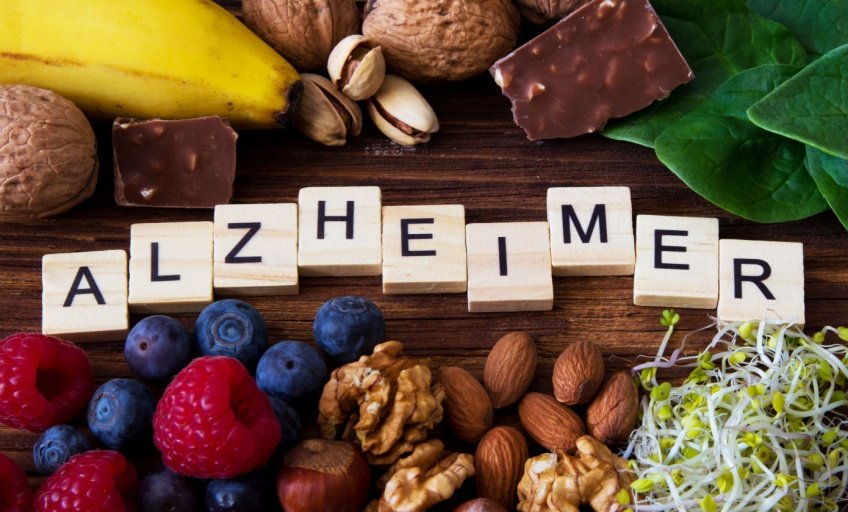Food plays an essential role in fighting Alzheimer’s and dementia. Anti-inflammatory diets like the Mediterranean and MIND diets may help slow the progression of Alzheimer’s disease. They may also reduce the risk of developing Alzheimer’s in people who don’t have the disease.
What you need to know:
- Understanding the link between diet and brain health
- Superfoods for the brain
- The MIND diet: A comprehensive approach to brain health
- Foods to limit: Unhealthy choices and their impact
Understanding the link between diet and brain health
Certain eating patterns may lower your risk of developing Alzheimer’s. However, if you have this cognitive condition, these eating patterns may slow the progression. Alzheimer’s can cause you to have tiny protein pieces called beta-amyloids in your brain. As they build up, they can form clumps, which blocks regular communication between nerve cells in the brain. Inflammation causes beta-amyloid levels to rise. Anti-inflammatory eating patterns may help reduce the levels of beta-amyloid in the brain.
Superfoods for the brain
The brain foods for Alzheimer’s are as mentioned below:
Leafy green vegetables
Leafy green vegetables like spinach, cabbage, lettuce, and turnip greens are high in vitamins, minerals, and fiber. Most can be found year-round and easily be incorporated into your meals. Adding a variety of greens to your diet may help boost brain health and lower your risk of obesity, heart disease, high blood pressure, and mental decline.
Berries

Berries like blueberries, raspberries, blackberries, and strawberries taste great, are highly nutritious, and provide many health benefits. They:
- Are loaded with antioxidants which help keep free radicals under control
- Help improve blood sugar and insulin response
- Are High in fiber
- Help fight inflammation
- Help lower your cholesterol
- Are good for your skin
- Help protect against cancer
- Keep your arteries healthy
Fatty fish
Eating fatty fish like Indian Mackerel, Sardines, Salmon, Hilsa, and Rohu provides many health benefits:
- High in important nutrients like protein, vitamin D, iodine, and minerals
- Lowers your risk of heart attacks and strokes
- Contains omega-3 fatty acids that are crucial during development
- Boosts brain health
- Helps prevent and treat depression
- Good dietary source of vitamin D
- Reduces your risk of autoimmune diseases
- Improves sleep quality
Nuts and seeds
A few examples of nuts are almonds, walnuts, pistachios, and peanuts, and seeds are flax seeds and pumpkin seeds. They contain antioxidants, omega-3 fatty acids, vitamin E, B complex, choline, magnesium, and zinc. These are shown to promote brain health and reduce age-related cognitive decline.
Whole grains
Whole grains like oats, corn, millet, quinoa, brown rice, whole rye, wheat berries, barley, etc., provide many health benefits. They:
- Are high in nutrients like vitamins, minerals (zinc, magnesium, iron, etc.), proteins, antioxidants, and fibers
- Lower your risk of heart disease, stroke, obesity, type 2 diabetes
- Support healthy digestion
- Reduce chronic inflammation
- Are linked to a reduced risk of premature death
The MIND diet: A comprehensive approach to brain health
Following the MIND diet can boost your brain health:
Key components of the MIND diet
The MIND diet combines two diet forms with known health benefits – Mediterranean and DASH. The name is short for Mediterranean-DASH Diet Intervention for Neurodegenerative Delay. It comprises 10 foods for Alzheimer’s: green leafy vegetables, other vegetables, nuts, berries, beans, whole grains, fish, poultry, olive oil, and wine.
Benefits of following the MIND diet
The MIND diet is designed to prevent or slow brain decline. There is strong evidence in support of its role in Alzheimer’s prevention. People who most closely followed a MIND eating pattern had a 53% reduced rate of developing Alzheimer’s. Even people who did a moderate job of following the MIND diet benefited, reducing their risk by 35%.
Foods to limit: Unhealthy choices and their impact
Not all foods promote brain health. Here are the foods you must avoid:
Processed foods and added sugars
The MIND diet specifically limits pastries, sweets, fried and fast food. Studies have linked high levels of sugar in the blood with dementia. Artificial sweeteners aren’t good either. Eating a lot of fried, processed foods tends to cause inflammation and damage to the blood vessels that supply the brain with blood. Their fried nature or high sodium content can increase blood pressure, and lead to plaque formation in the blood vessels, which can restrict the blood flow to the brain.
Red meat and saturated fats

Red meat, butter, and full-fat cheese are high in saturated fat, which is bad for your heart and brain. You should have less than:
- 4 servings a week of red meat
- A tablespoon of butter a day, and
- A serving of whole-fat cheese in a week, fried food, and fast food.
Several factors may increase or decrease the risk of the development of Alzheimer’s disease. Among them, diet is a risk factor you may have control over. So ensure you eat a nutritious diet, keeping the aforementioned in mind.
Stay tuned to the Activ Living Community. Keep up to date with the latest health tips and trends through expert videos, podcasts, articles, and much more on nutrition, fitness, mindfulness, and lifestyle conditions like Asthma, Blood Pressure, Cholesterol, and Diabetes. Activ Living ke saath sahi sehat ki shuruat ABHI karo.
You may also be interested in the following blogs:
Popular Searches
How to lower blood pressure | Fruits good for liver | Unhealthy foods | Ragi Benefits | Basal Metabolic Rate | Acupressure points for High Blood Pressure | Ayurvedic medicine for blood pressure | How to control cholesterol at home | Homeopathy for Asthma | Biological Age | Home remedies for TB | Natural beta blockers | Negative effects of internet | Types of walking | Blood pressure calculator | Blood sugar calculator | BMI Calculator





 1800-270-7000
1800-270-7000








